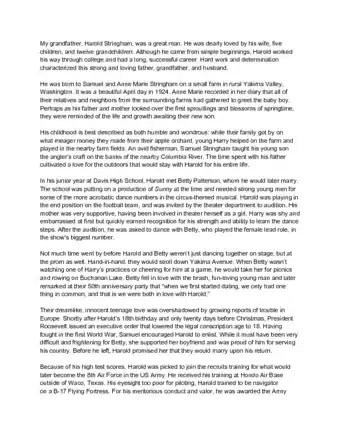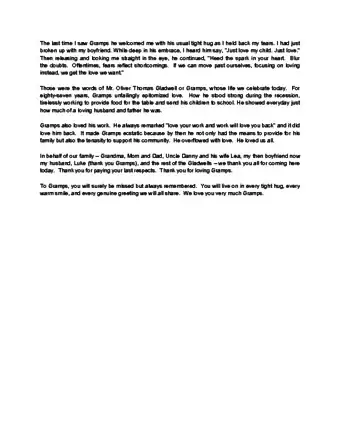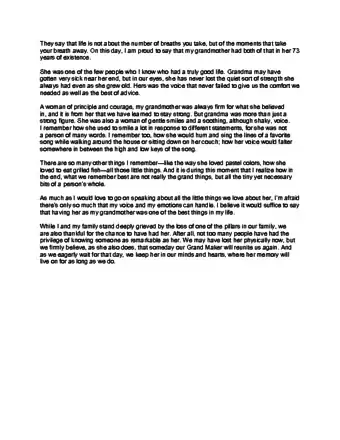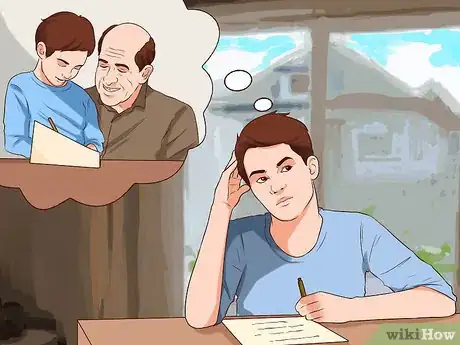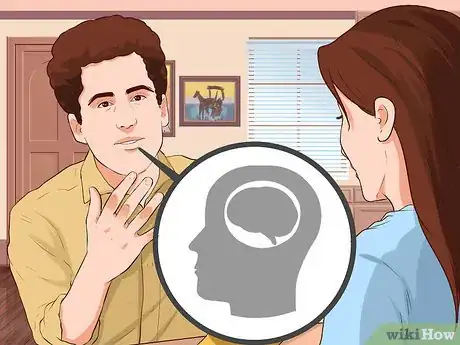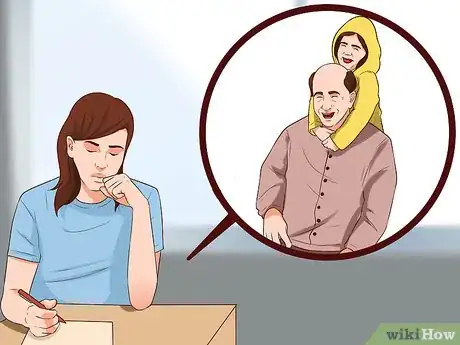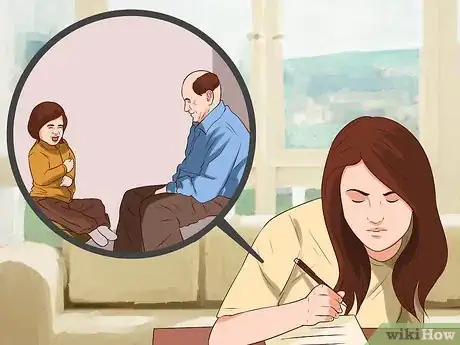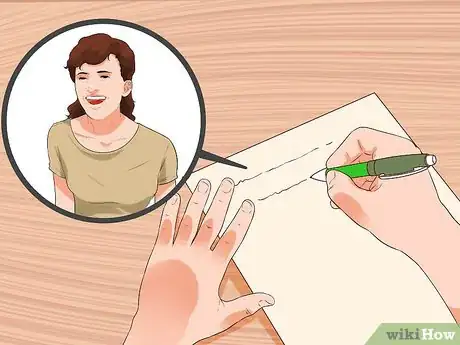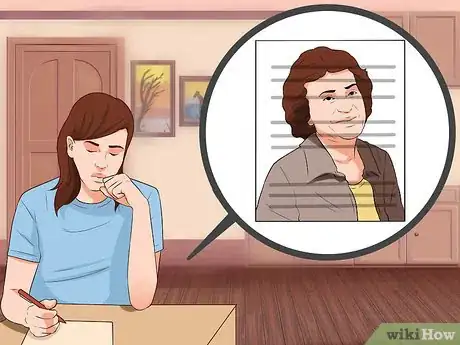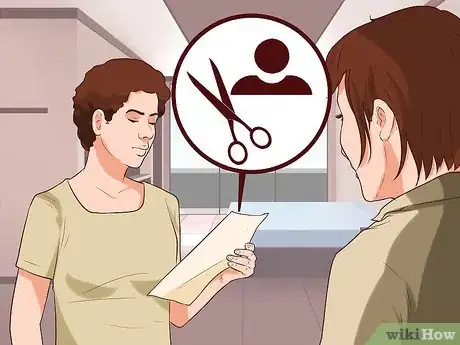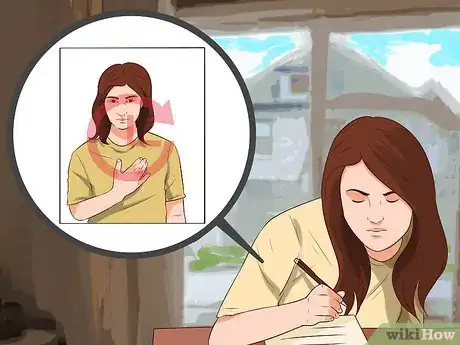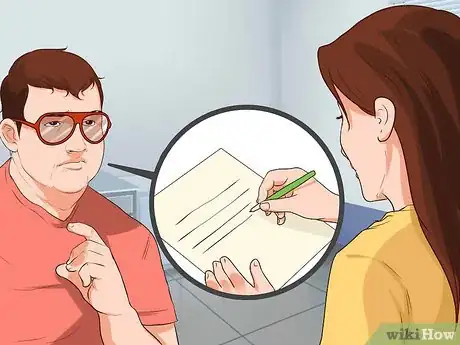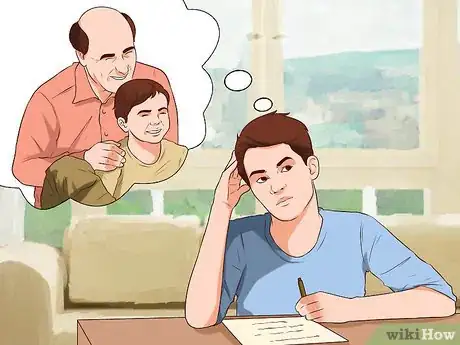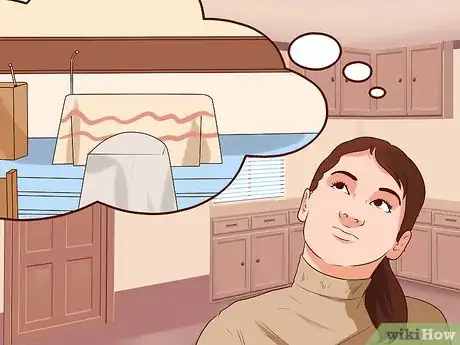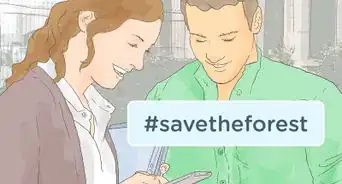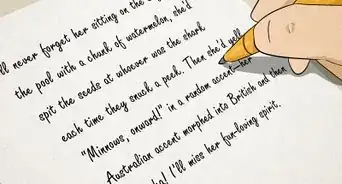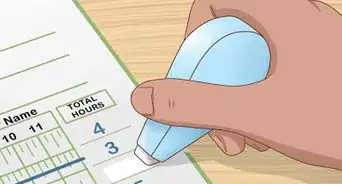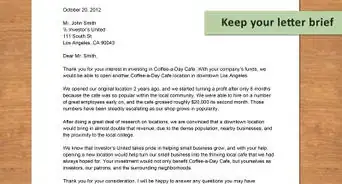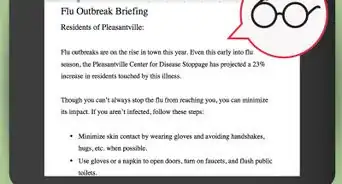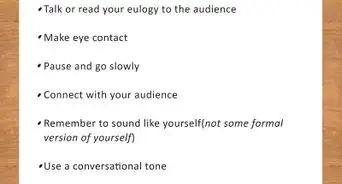This article was co-authored by Rebecca Tenzer, MAT, MA, LCSW, CCTP, CGCS, CCATP, CCFP. Rebecca Tenzer is the owner and head clinician at Astute Counseling Services, a private counseling practice in Chicago, Illinois. With over 18 years of clinical and educational experience in the field of mental health, Rebecca specializes in the treatment of depression, anxiety, panic, trauma, grief, interpersonal relationships using a combination of Cognitive Behavioral therapy, Psychodynamic therapy, and other evidence-based practices. Rebecca holds a Bachelor of Arts (BA) in Sociology and Anthropology from DePauw University, a Master in Teaching (MAT) from Dominican University, and a Master of Social Work (MSW) from the University of Chicago. Rebecca has served as a member of the AmeriCorps and is also a Professor of Psychology at the collegiate level. Rebecca is trained as a Cognitive Behavioral Therapist (CBT), a Certified Clinical Trauma Professional (CCTP), a Certified Grief Counseling Specialist (CGCS), a Clinical Anxiety Treatment Professional (CCATP), and a Certified Compassion Fatigue Professional (CCFP). Rebecca is also a member of the Cognitive Behavioral Therapy Society of America and The National Association of Social Workers.
wikiHow marks an article as reader-approved once it receives enough positive feedback. In this case, 96% of readers who voted found the article helpful, earning it our reader-approved status.
This article has been viewed 374,705 times.
A eulogy is a speech about a person who has died, typically delivered at the funeral service. Several eulogies might be given from people who knew the deceased as a coworker, a classmate, a neighbor, etc. To write a eulogy for a grandparent, you should concentrate on your relationship as his or her grandchild, rather than trying to encompass your grandparent's entire life. Funerals can be difficult for everyone who knew the departed, but knowing how to write a strong eulogy can help give you and everyone else in attendance a sense of peace and closure.
Steps
Planning a Eulogy
-
1Brainstorm and plan. During the brainstorming session, you'll need to be capable of letting some ideas go. You won't be able to fit everything you want to say into one speech, so don't try to give a detailed biography of your grandparent's entire life. Think about specific memories of your grandparent: times you spent together, occasions that strike you as being definitive of your grandparent's personality, and so on.[1] Write everything down, and don't feel obligated to include everything that makes the list.
- Ask yourself what qualities best describe your grandparent.
- Consider what set your grandparent apart from anyone else you know.
- If your grandparent had certain hobbies or passions in life, you may want to mention those. But there's no need to make these the focus of your eulogy, as it should be primarily about the departed's role as your grandparent.
-
2Ask about other people's memories. The focus of your eulogy should be on how the departed was a caring grandparent in your life. But that doesn't mean you can't open up to other people who knew your grandparent. Asking your parents or aunts/uncles about their relationship with your grandparent might be a good place to start. You could even ask any close friends of your grandparent what their favorite memories are of your grandparent. It might help give you some ideas on how other people knew your grandparent, and why your grandparent was important to people outside your family.
- When speaking with others about your grandparent, you may want to consider asking how and when they first met your grandparent (if there is no familial relation), what their favorite memories are with your grandparent, and what your grandparent's best qualities were. The answers may vary greatly from your own list if the person was a friend rather than a relative of your grandparent, which can help you open your eulogy to include how others saw your grandparent.
Advertisement -
3Look for illuminating memories. As you comb over the memories you have of your grandparent, look for moments that characterize your grandparent best. Did he/she ever say or do something that has always made you think, "That's the essence of my grandparent"? It doesn't need to be a huge, life-changing moment. Often the best illuminating memories of a person are the little things they said or did, the day-to-day qualities that contribute to the person's identity and personality.[2] [3]
- As you begin writing down your memories, focus on writing a series of little truths. Avoid the big, sweeping declarations and focus on the little details that defined your grandparent or your relationship with your grandparent.[4]
-
4Be concrete. Don't just write that your grandparent was caring. Write out a specific memory that will illustrate your grandparent's caring nature. If your grandparent had a wonderful sense of humor, don't just say he/she was funny. Write about his/her humor, perhaps a time your grandparent played a practical joke or told a funny story. Remember that not everyone has the same memories of your grandparent that you have. Your eulogy should illustrate for everyone at the funeral what your relationship was like, and what the departed was like as a grandparent.
Setting the Tone
-
1Make people laugh without telling jokes. Remember that you're not writing a standup comedy routine. But eulogies often elicit a little laughter from the congregation, which can be helpful for everyone who is mourning. Don't write a slapstick comedy, but try to give one or two little anecdotes that will make anyone who knew your grandparent chuckle and think, "That's so true!" Or you may want to tell an anecdote that will end with a twist no one was expecting, but which captures a quirk about your grandparent. However you choose to write the eulogy, remember that laughter helps people heal, and you don't need too much of it to be successful.[5]
- Don't write jokes. Remember that it's still a funeral, but one or two humorous and well-placed anecdotes can help lighten the mood and make everyone remember the fond, happy memories they had of your grandparent.[6]
-
2Tailor the speech to your grandparent. It's important to consider your grandparent's personality as you draft your eulogy. If your grandparent was very serious in life, you may want to avoid humorous anecdotes. If your grandparent was extremely religious, then feel free to mention the role that faith played in your grandparent's life. There is no absolute rule in writing a eulogy, other than trying your hardest to capture your grandparent's spirit and personality in writing. Focus on what your grandparent would have wanted to hear, and what is appropriate and important in memorializing his or her life.[7]
-
3Edit yourself out. It's okay if the first draft of your eulogy focuses on your thoughts and feelings, but remember that it isn't ultimately about you. It's perfectly acceptable to write about your specific relationship with your grandparent, but avoid lingering on how you feel or what you're thinking. Everyone knows you care about your grandparent and will miss him or her, and what they really want to hear is a loving tribute to your grandparent's life.
- Consider having someone else read your eulogy beforehand and ask them if there's too much of you in it. Having an outsider's opinion may help you recognize ways to focus more on your grandparent and your relationship than on your subjective feelings.
- It's fine for your eulogy to be short and sweet, and it can take any form you want it to. For instance, you can share a poem, a slideshow, or a brief memory that means a lot to you.[8]
Preparing the Eulogy
-
1Write a brief introduction. If you come from a large family, or if your grandparent had a lot of friends, there's a chance that not everyone will know you as the grandchild. Keep your introduction very brief - just a short sentence will suffice. The introduction should simply let people know your name and your relation to the deceased.
-
2Coordinate with other speakers. If other relatives or friends will be giving their own eulogies at the service, you may want to reach out to those speakers in advance. Coordinate what each speaker intends to talk about so that you don't all cover the same qualities or tell the same stories.
-
3Know if there's a time limit. Sometimes when there are multiple speakers at a funeral, you may be asked to keep your eulogy under a certain time limit. Even if there isn't an explicit time limit given to you, it's important to remember that your eulogy shouldn't go on and on forever. Be respectful and know when to cut down the length of your eulogy.[9]
- Try to keep the eulogy under five minutes, even if there is no explicit time limit. After five minutes most people find it difficult to keep listening, especially if they are overcome with grief.
-
4Avoid trying to make sense of things. You won't do your grandparent any favors by trying to make sense of his or her death. And you're not going to be able to contextualize an entire life. So rather than trying to tell anyone what to think of your grandparent's life and death, it's best to focus on what made your grandparent's life so important. There's no need to mention how it will be hard to fill the void they've left, because everyone is probably thinking the same thing. Rather than state the obvious, focus on making the eulogy a loving tribute to the life your grandparent lived.
- It can help to keep in mind that giving a eulogy is as much about your healing as it is about the people in the audience.[10]
-
5Practice the eulogy at home. It's generally a good idea to practice any speech ahead of time, and a eulogy is no different. You will most likely cry during the eulogy - and that's okay. It's natural to cry at a funeral, especially when you're recalling all the wonderful memories you have of your grandparent. But you don't want to be so emotional that your loving tribute is lost under uncontrollable tears and sobs. Practicing beforehand will allow you to get some of the crying off your chest when no one is around, which is important, as this may be the first time you've spoken candidly about your grandparent's death. Don't be afraid to cry, but let yourself have a good cry before you're expected to speak to the congregation.[11]
-
6Figure out the logistics. It's important to know the specifics of the funeral's location before the service. Knowing where you'll be speaking, whether there are any obstacles to walk over, and whether there is a microphone are all important factors to consider when planning to deliver a eulogy. And don't forget to bring a written copy of your final eulogy to the service. Even if you think you've got it memorized, it's a good idea to bring a hard copy, just in case.[12]
Expert Q&A
-
QuestionHow do you start writing an eulogy?
 Rebecca Tenzer, MAT, MA, LCSW, CCTP, CGCS, CCATP, CCFPRebecca Tenzer is the owner and head clinician at Astute Counseling Services, a private counseling practice in Chicago, Illinois. With over 18 years of clinical and educational experience in the field of mental health, Rebecca specializes in the treatment of depression, anxiety, panic, trauma, grief, interpersonal relationships using a combination of Cognitive Behavioral therapy, Psychodynamic therapy, and other evidence-based practices. Rebecca holds a Bachelor of Arts (BA) in Sociology and Anthropology from DePauw University, a Master in Teaching (MAT) from Dominican University, and a Master of Social Work (MSW) from the University of Chicago. Rebecca has served as a member of the AmeriCorps and is also a Professor of Psychology at the collegiate level. Rebecca is trained as a Cognitive Behavioral Therapist (CBT), a Certified Clinical Trauma Professional (CCTP), a Certified Grief Counseling Specialist (CGCS), a Clinical Anxiety Treatment Professional (CCATP), and a Certified Compassion Fatigue Professional (CCFP). Rebecca is also a member of the Cognitive Behavioral Therapy Society of America and The National Association of Social Workers.
Rebecca Tenzer, MAT, MA, LCSW, CCTP, CGCS, CCATP, CCFPRebecca Tenzer is the owner and head clinician at Astute Counseling Services, a private counseling practice in Chicago, Illinois. With over 18 years of clinical and educational experience in the field of mental health, Rebecca specializes in the treatment of depression, anxiety, panic, trauma, grief, interpersonal relationships using a combination of Cognitive Behavioral therapy, Psychodynamic therapy, and other evidence-based practices. Rebecca holds a Bachelor of Arts (BA) in Sociology and Anthropology from DePauw University, a Master in Teaching (MAT) from Dominican University, and a Master of Social Work (MSW) from the University of Chicago. Rebecca has served as a member of the AmeriCorps and is also a Professor of Psychology at the collegiate level. Rebecca is trained as a Cognitive Behavioral Therapist (CBT), a Certified Clinical Trauma Professional (CCTP), a Certified Grief Counseling Specialist (CGCS), a Clinical Anxiety Treatment Professional (CCATP), and a Certified Compassion Fatigue Professional (CCFP). Rebecca is also a member of the Cognitive Behavioral Therapy Society of America and The National Association of Social Workers.
Clinical Therapist & Adjunct Professor Clinical Therapist & Adjunct ProfessorExpert AnswerOne of the best things to do is sit down and think about memories you have had with that person. Think about the ones that stand the most, feelings or thoughts that are attached to those memories. Focus on visions, places, sounds and smells that bring you joy.
Clinical Therapist & Adjunct ProfessorExpert AnswerOne of the best things to do is sit down and think about memories you have had with that person. Think about the ones that stand the most, feelings or thoughts that are attached to those memories. Focus on visions, places, sounds and smells that bring you joy. -
QuestionHow do you process the death of a loved one and write about it?
 Rebecca Tenzer, MAT, MA, LCSW, CCTP, CGCS, CCATP, CCFPRebecca Tenzer is the owner and head clinician at Astute Counseling Services, a private counseling practice in Chicago, Illinois. With over 18 years of clinical and educational experience in the field of mental health, Rebecca specializes in the treatment of depression, anxiety, panic, trauma, grief, interpersonal relationships using a combination of Cognitive Behavioral therapy, Psychodynamic therapy, and other evidence-based practices. Rebecca holds a Bachelor of Arts (BA) in Sociology and Anthropology from DePauw University, a Master in Teaching (MAT) from Dominican University, and a Master of Social Work (MSW) from the University of Chicago. Rebecca has served as a member of the AmeriCorps and is also a Professor of Psychology at the collegiate level. Rebecca is trained as a Cognitive Behavioral Therapist (CBT), a Certified Clinical Trauma Professional (CCTP), a Certified Grief Counseling Specialist (CGCS), a Clinical Anxiety Treatment Professional (CCATP), and a Certified Compassion Fatigue Professional (CCFP). Rebecca is also a member of the Cognitive Behavioral Therapy Society of America and The National Association of Social Workers.
Rebecca Tenzer, MAT, MA, LCSW, CCTP, CGCS, CCATP, CCFPRebecca Tenzer is the owner and head clinician at Astute Counseling Services, a private counseling practice in Chicago, Illinois. With over 18 years of clinical and educational experience in the field of mental health, Rebecca specializes in the treatment of depression, anxiety, panic, trauma, grief, interpersonal relationships using a combination of Cognitive Behavioral therapy, Psychodynamic therapy, and other evidence-based practices. Rebecca holds a Bachelor of Arts (BA) in Sociology and Anthropology from DePauw University, a Master in Teaching (MAT) from Dominican University, and a Master of Social Work (MSW) from the University of Chicago. Rebecca has served as a member of the AmeriCorps and is also a Professor of Psychology at the collegiate level. Rebecca is trained as a Cognitive Behavioral Therapist (CBT), a Certified Clinical Trauma Professional (CCTP), a Certified Grief Counseling Specialist (CGCS), a Clinical Anxiety Treatment Professional (CCATP), and a Certified Compassion Fatigue Professional (CCFP). Rebecca is also a member of the Cognitive Behavioral Therapy Society of America and The National Association of Social Workers.
Clinical Therapist & Adjunct Professor Clinical Therapist & Adjunct ProfessorExpert AnswerLosing family members can be one of the most difficult things you will have to deal with in life. It can be hard to write about it in a eulogy, so reflect on what you think is the most important thing to know about the person who is no longer with you. Also, try not to put too much pressure on yourself to create something magnificent.
Clinical Therapist & Adjunct ProfessorExpert AnswerLosing family members can be one of the most difficult things you will have to deal with in life. It can be hard to write about it in a eulogy, so reflect on what you think is the most important thing to know about the person who is no longer with you. Also, try not to put too much pressure on yourself to create something magnificent. -
QuestionShould I mention the surviving spouse?
 Community AnswerYou should ask if they are comfortable with being mentioned, and then gage your reaction from there.
Community AnswerYou should ask if they are comfortable with being mentioned, and then gage your reaction from there.
Warnings
- A funeral is not the time to "set the record straight" about your grandparent or to resolve family issues. Be kind and try to give as loving a tribute as possible.⧼thumbs_response⧽
- Never make your eulogy into a poem. The attendees will be distracted from the meaning because they will be concentrating on the rhythm and rhyme of the poem.⧼thumbs_response⧽
References
- ↑ Rebecca Tenzer, MAT, MA, LCSW, CCTP, CGCS, CCATP, CCFP. Clinical Therapist & Adjunct Professor. Expert Interview. 29 November 2021.
- ↑ Rebecca Tenzer, MAT, MA, LCSW, CCTP, CGCS, CCATP, CCFP. Clinical Therapist & Adjunct Professor. Expert Interview. 29 November 2021.
- ↑ http://www.huffingtonpost.com/carol-dechant/your-gift-of-a-eulog_b_834660.html
- ↑ http://www.esquire.com/lifestyle/how-to/a735/how-to-give-a-eulogy/
- ↑ http://www.esquire.com/lifestyle/how-to/a735/how-to-give-a-eulogy/
- ↑ http://www.esquire.com/lifestyle/how-to/a735/how-to-give-a-eulogy/
- ↑ http://www.esquire.com/lifestyle/how-to/a735/how-to-give-a-eulogy/
- ↑ Rebecca Tenzer, MAT, MA, LCSW, CCTP, CGCS, CCATP, CCFP. Clinical Therapist & Adjunct Professor. Expert Interview. 29 November 2021.
- ↑ http://www.esquire.com/lifestyle/how-to/a735/how-to-give-a-eulogy/
- ↑ Rebecca Tenzer, MAT, MA, LCSW, CCTP, CGCS, CCATP, CCFP. Clinical Therapist & Adjunct Professor. Expert Interview. 29 November 2021.
- ↑ http://www.esquire.com/lifestyle/how-to/a735/how-to-give-a-eulogy/
- ↑ http://www.esquire.com/lifestyle/how-to/a735/how-to-give-a-eulogy/
About This Article
Writing a eulogy for your grandparent can be hard and emotional, but it can also give you an opportunity to say goodbye and celebrate their life. Before you draft your eulogy, try brainstorming happy memories you have of your grandparent, things you were proud of them for, and hobbies or interests that were important to them. You can also ask your parents and other family members what they remember best about your grandparent. If there are other speakers giving eulogies, ask them what they’ll be talking about so you don’t say the same things. Start your eulogy with a short introduction telling people who you are in case they don’t know. Then, write a paragraph for each memory or characteristic you think paints a picture of your grandparent’s life. Try to keep things under 5 minutes if you haven’t been given a time limit. For more tips, including how to edit your eulogy once you’ve written a first draft, read on.
